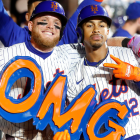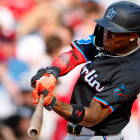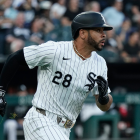The Astros won Game 6 of the ALCS, 7-1, Friday night in Houston's Minute Maid Park. As is the case with every postseason game, we'll be breaking down many angles (things to know about Game 6 here, for example), but one that stuck out to me in particular was the use of Astros closer Ken Giles.
Giles entered the ninth inning with a six-run Astros lead. That seems unnecessary on the surface. On a certain level, I get it, of course. Astros manager A.J. Hinch is no dummy, in fact, he's one of the most cerebral managers in the game. He knows that there's no Game 7 unless his team closes down Game 6. He left nothing to chance and used his closer to make sure there would be a game on Saturday night. I like that part of it. Love it, in fact.
I just couldn't shake the last Game 6 Major League Baseball gave us from my psyche.
That would be Game 6 of the 2016 World Series. The Cubs were down 3-2 in the best-of-seven series, much like these Astros in this ALCS. The Cubs had a 7-2 lead in the bottom of the seventh inning. There were two runners on base. Cubs manager Joe Maddon elected to go to Aroldis Chapman to escape the jam. It was understandable, given the circumstances.
What followed really wasn't.
Maddon used Chapman again in the eighth, with a five-run lead.
Then, with a 9-2 lead in the ninth, Maddon started the inning with Chapman because he said he didn't have another guy ready when Anthony Rizzo hit a two-run homer.
Chapman threw 20 pitches, most of them unnecessary, and in Game 7 blew the save. Sure, the Cubs won, but we can take some lessons away from the game, right?
Fast-forward to Friday night.
Giles closed down the game, but it was one inning and a six-run lead. Hinch didn't have anyone else in the bullpen who could get three outs before coughing up six runs? I know the 'pen has been shaky in the playoffs, but this isn't exactly a Herculean task.
Again, I understand the thought process. If I'm in the dugout, I might do the same thing. You can't leave this to chance at all. I get it.
It's just that the move is now worth our scrutiny because Game 7 matters. Did Hinch's use of Giles provide the Yankees with an opening for their Rajai Davis moment?
Giles threw 23 pitches in Game 6. Game 7 comes without any rest. Let's look at what happened this season to see what might have gone into the decision.
Thirteen times this season Giles went back-to-back. In the second such day, he had a 2.13 ERA and hitters slashed .182/.250/.318 against him. Overall, he had a 2.30 ERA and hitters slashed .198/.268/.297.
Well lookie what we have here. He was better! Those numbers back Hinch up.
One thing here, though: The most pitches Giles ever threw on the front leg of a back-to-back this season was 22. In Game 6, he threw 23.
Perhaps there's uncharted territory, but isn't Game 7 of the ALCS uncharted territory anyway?
In all, I tend to be more worried about how shaky Giles has been this postseason (7.50 ERA, 1.80 WHIP in 6 IP) than him going back to back after 23 pitches, but everything is a piece of the puzzle as the players gird up their loins to take the field of battle for Game 7.
It all comes down to one game for each team. The use of Giles in Game 6 wasn't reckless, but it definitely felt unnecessary. That doesn't make it a bad decision by Hinch -- in fact, if you wanted me to take a side, I'd take his -- but it seems to me that it's a factor for Saturday night. It's something to watch. Let's just agree to keep it in mind if case the game is close, OK?


















